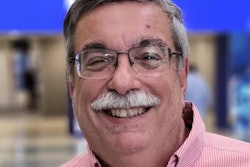
I've been known to complain a time or two or three (or more) in my lifetime, but never have I seen so much in print as I have lately about radiologists' stress, job requirements, and other issues that make their lives so difficult. I laugh when I read comments like "No way would I take $350,000 a year." Please send that job my way -- and I can do with only four weeks of vacation instead of 12.
 The PACSman, Mike Cannavo.
The PACSman, Mike Cannavo.Now, I am not minimizing or taking away from the years of school and training and experience most radiologists have, as well as the possible liabilities they face every day from a missed call. But the reality is that's part of the job.
I am also not saying that radiologists don't deserve every penny they earn -- but seriously, doesn't some stress go with every job? An entry-level police officer in Orlando makes just over $52,000 with a $165 shoe allowance and requires specialized training. That's about $1,000 per week, not per day. I would also venture to say that their stress is fairly significant, too. But instead of malpractice insurance, they have bulletproof vests that they hope take the hit when shots come their way.
Also, the median teacher salary in Florida is less than $60,000. That's just over $1,000 a week as well. And the stressors? How about knowing that what you do or don't do in the time you are with that student could literally change their life forever. Different stressors? Absolutely. You could pick any other job in the country and find some degree of stress.
Most radiologists and others start out in medicine because they enjoy it and want to make a difference. But things have evolved in recent years. A recent study of over 9,000 radiologists published in Becker's Hospital Review found that bureaucratic demands lead the list of things that took away the joy radiologists have in their jobs, with 61% identifying this as a primary reason. This was followed by a lack of respect from coworkers (38%), personality traits (33%), and stress related to COVID (8%). Responses also indicated that increased compensation, more manageable workloads, and support/respect from supervisors and colleagues are key to addressing the issue of burnout and its accompanying symptoms.
Defining burnout
So just how is burnout defined? The article indicates burnout as "long-term, unresolved, job-related stress leading to exhaustion, cynicism, detachment from job responsibilities, and lacking a sense of personal accomplishment." Don't want that? Then be a waste collector. Yes, you have the equivalent of relative value units (RVUs) having to complete a route within a defined time period, but you set your own pace, have a sense of accomplishment when you complete your route within the delegated time frame, and have limited responsibilities except to not damage the can or bin (but if they do get damaged they can be replaced and it doesn't come out of your pocket either). There is also nothing to be cynical about, either.
Exhausted? You bet, but it's a good exhaustion, and you sleep well at night as long as you don't worry how you will support a wife and kids on $30,000 a year. Don't like the job title? Then call yourself a sanitation engineer. Want to make more money? Drive for Amazon, UPS, or FedEx. Bigger stresses, but bigger bucks -- an extra $2-$5 an hour. You hopefully get my drift here.
I had to laugh when I read the section in the article that said rads wanted "increased compensation, more manageable workloads, and support/respect from supervisors and colleagues..." to address burnout. More compensation? A story on AuntMinnie.com stated that "radiology had an average starting salary of $455,000 during the 2021/2022 survey period, up 13.4% compared with an average starting salary of $401,000 in 2020/2021, according to a survey released by healthcare recruiting firm Merritt Hawkins."
That's a starting salary -- and excludes profit sharing and other incentives. Most radiologists make considerably more after just a few years, while some make slightly less depending on where they are in the country. Regardless, it's fair to say most aren't hurting, at least not financially. So why do we continue to see posts like "So tired," "Anyone feel like they have had enough?" "Quiet quitting and radiologist burnout," and my favorite, "Am I dumb to retire at age 37?"
Let's address the last one first. Assuming you are able to put enough money away after just 7 or 8 years of being a board-certified radiologist, what's holding you back? I have always told my sons, "Do what you love, love what you do." If you can live on half your salary (which is still fairly princely) and bank and invest the rest, you should be able to have well over $1 million in the bank after taxes. You may not be able to fully retire on that, but going from full-time to part-time should more than allow you to live comfortably, even with a spouse and children.
Creature comforts
The problem is that many get used to living a lifestyle that revolves around creature comforts. Now I'm not saying you shouldn't live comfortably or even very comfortably. But how many creature comforts do you need to make yourself "happy"? It's also not just some radiologists who suffer from NED (Not Enough Disease); there are many in other disciplines for whom existence in a higher income bracket seems to be a requirement. Radiologists actually rank 7th out of 29 medical subspecialties for stress -- behind emergency medicine, internal medicine, and surprisingly, pediatrics. No doubt dealing with the parents versus the kids got pediatrics into the #3 spot, but alas, I digress. Other findings:
- Burnout increased 6% in the last year (53% in 2022 vs. 47% in 2021), and jumped 26% since 2018.
- Female physicians were more likely to report burnout, at 63%, compared with male physicians, at 46%.
- Nearly 80% of physicians described their level of burnout as moderate to severe.
- Two out of three physicians reported that burnout has harmed their relationships.
- Depression slightly increased in the last year, but it is up by 8% since 2018 (23% in 2022 vs. 15% in 2018).
- Of physicians reporting depression, 67% identified colloquial depression -- feeling down or sad -- and 24% reported clinical depression -- severe, lasting, and not caused by a normal grief event.
- 64% of physicians pointed to job burnout as their primary reason for depression.
- One in five physicians said they turn to alcohol and binge eating as coping mechanisms, and 40% prefer to spend time alone.
Everything in life has stress attached to it. One would think being in the medical profession one would be able to address stress better than most, but obviously that is not the case, as demonstrated by many of the points above. On the plus side, in theory, you can work 10 years and then call it quits. The new radiologists just starting out have the potential to retire young.
Who is to say you can't enjoy life while you are still young, besides those posts that ask, "Is $5M enough to retire on or is $10M the minimum?" Those are from established radiologists who have been in practice way longer than they need to be, have been married way too long with a spouse and/or children spoiled by the lifestyle they have chosen to live, or who didn't get the best divorce lawyer they could afford.
It all depends on what you plan to do when you stop working. I love what I am doing, so I doubt I will ever retire. That said, until that time, it would be good to make a few bucks and not be expected to dispense free advice again and again when I'm asked, "Can you take a look at some x-rays and tell me what you think?"
Dealing with stress
There are solutions to address and minimize stress. Workflow orchestration software that automatically manages PACS worklists and eliminates or reduces things like cherry-picking and load balancing exists to evenly distribute studies among the radiologists. Sadly, not all facilities use it or use it properly, even though many PACS offer some form of WOS in their base system design.
Ideally workflow orchestration also requires radiologists who read by subspecialty area and then once their queue is done read from the general worklist based on the study's aging. If the group reads by subspecialty, it's critical to direct studies to those who can read those studies the best and fastest. Reading by subspeciality isn't required but it can positively impact turnaround time and productivity.
Ensuring radiologists get a good mix of exams is also key. There are also some systems that use artificial intelligence (AI) to evaluate the complexity of cases and make measurements relative to the RVU that standard RVUs don't consider to positively impact load balancing. Other factors like using structured reporting beyond mere templating and even the ability to work from home are helping radiologists deal with their day-to-day stresses.
It's good that the radiology community is recognizing stress is a major factor in burnout and has tools available to help minimize this. With the radiologist shortage, losing even one radiologist in a group can be an issue -- especially in smaller groups or where their subspecialty expertise is required.
The bottom line is that everyone experiences stress, but not everyone has the financial ability to address it or, if/as needed, the ability to walk away from it, either. The best bet is to use day-to-day, work-related tools at your disposal to help address it, work through the stress with professional help, or find other outlets like golf that allow you to take your mind off the daily routine stress so you can handle it when it shows up.
Michael J. Cannavo is known industry-wide as the PACSman. After several decades as an independent PACS consultant, he worked as both a strategic accounts manager and solutions architect with two major PACS vendors. He has now made it back safely from the dark side and is sharing his observations.
His healthcare consulting services for end users include PACS optimization services, system upgrade and proposal reviews, contract reviews, and other areas. The PACSman is also working with imaging and IT vendors to develop market-focused messaging as well as sales training programs. He can be reached at [email protected] or by phone at 407-359-0191.
The comments and observations expressed are those of the author and do not necessarily reflect the opinions of AuntMinnie.com.



















